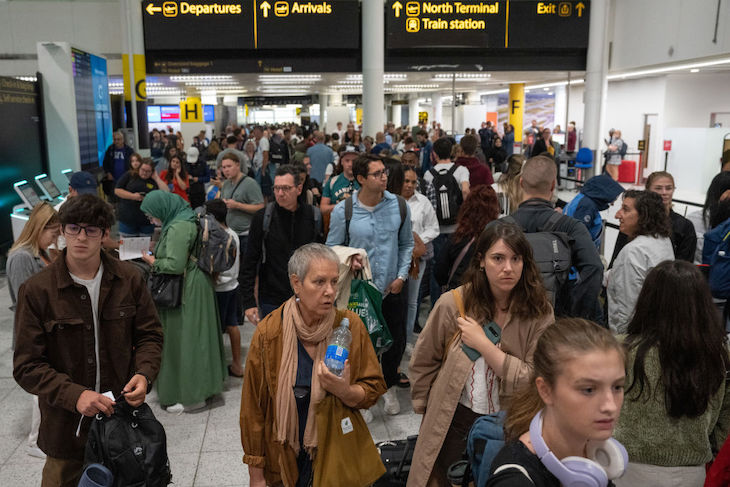A faulty flight plan filed by a French airline is unofficially being blamed for the meltdown in our national air traffic control system on Monday. While Nats (National Air Traffic Services) has declined to comment, it should come as no comfort if it turns out to have been a cock-up rather than – as many initially feared – a cyber attack. If one badly-filed flight plan can cause delays for days on end – as the airlines are warning us – it is an alarming reminder of how vulnerable our transport infrastructure has become. It wouldn’t take much input from a hostile state to bring the country to a halt.
You can see the vulnerability everywhere – it is the price we pay for running transport so close to the bone. It is there to be seen on the roads, where one accident almost instantly leads to miles of tailbacks. Our national practice of running utilities beneath the road rather than in channels alongside compounds the problem. A burst water main or broken electricity cable – all the more likely when we allow 44 tonne lorries on roads which are not even nearly fit for the job – and we lose vital road capacity as well as the utility. Around my way in East Anglia all three roads linking us to our nearest town, Newmarket, were recently closed at once.
We are largely stuck with much of the infrastructure we had in the 1970s
The problem is made worse by a planning system which continues to allow many thousands of new homes to be built in places which make their occupants utterly reliant on cars. By the way, I am all in favour of 15 minute cities – so long as they don’t involve wretched number plate cameras and fines – and I don’t understand the opposition to the principle of bringing public services closer to where people live.
You can see our vulnerability, too, on the railways, where we are trying to squeeze every last inch out of a shrunken rail system. The opportunities for diversion when something goes wrong are non-existent in many parts of the network, partly as a result of the Beeching closures and partly because peripheral routes are no longer maintained to the standard required to take an inter city train. HS2 was supposed to be part of the solution in providing extra capacity, but initial plans involved putting nearly every express train from London to the North of England on one line, at three minute intervals. It doesn’t take much to imagine the havoc when even one train was delayed – there would be no time to recover the timetable without cancellations.
And then, of course, is air travel. While other countries build new airports and runways, we are largely stuck with much of the infrastructure we had in the 1970s, when air traffic was a third of what it is now. The only new runway at a major international airport built in the years since was at Manchester over two decades ago. We have been talking about a third runway for Heathrow since 1946 – yes, 77 years ago.
Our water and electricity infrastructure is affected too. Our essential problem is that around 40 years ago we lost pride in building infrastructure. Instead, we moved to a system where private owners were incentivised to sweat their assets to the last, rather than invest in new stuff. The result has been to turn Britain into a creaking hull of a country – and a saboteur’s dream. Monday’s events may not turn out to have been caused by a cyber attack – although it hasn’t been ruled out – but they will certainly be studied with great interest by hostile nations.







Comments